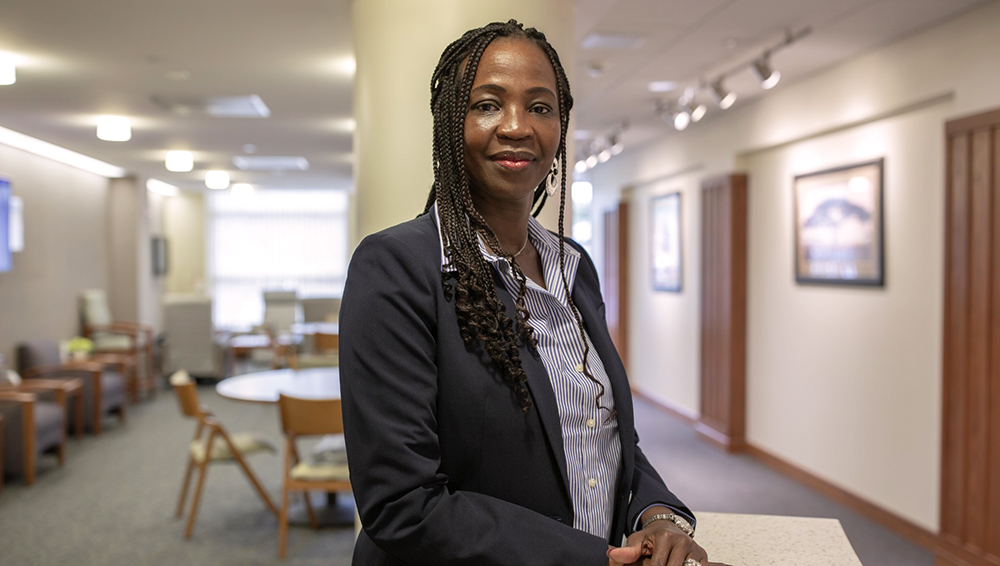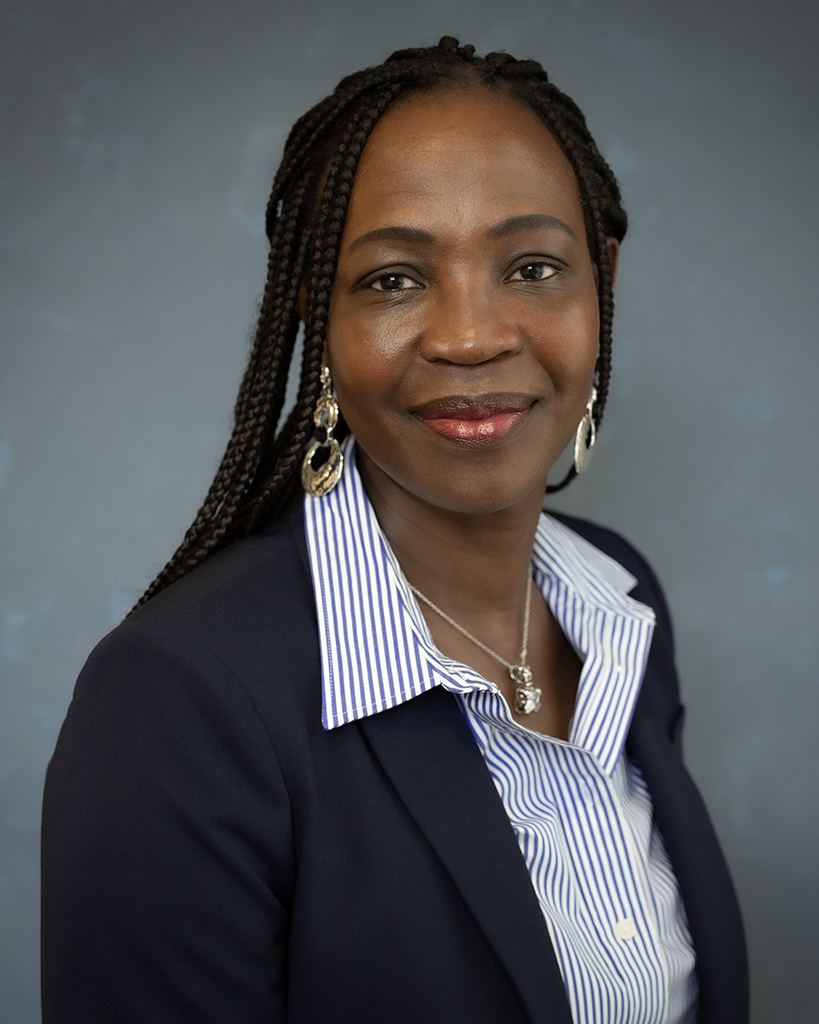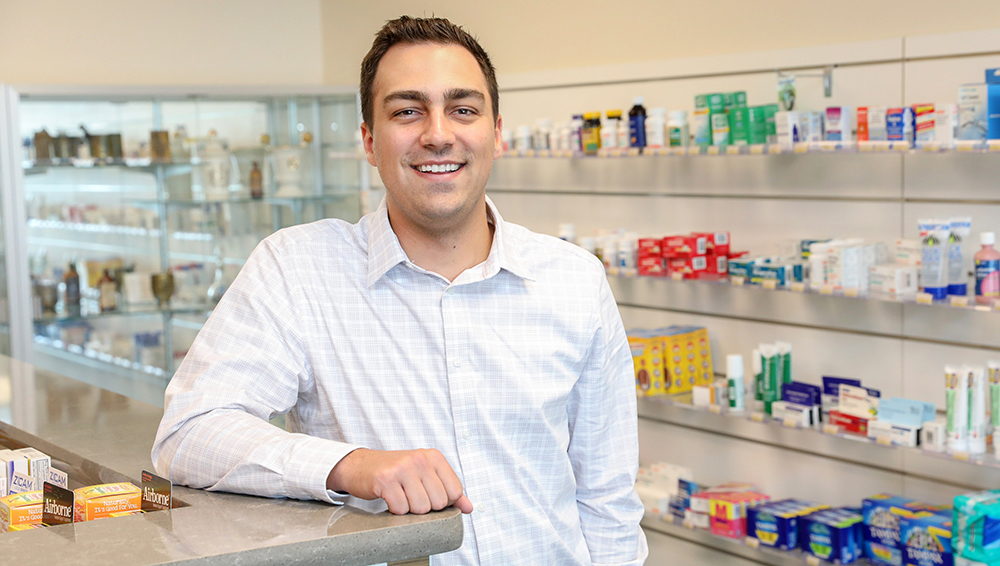
Alumna Hannet Tibagwa Ambord, Pharmacy Society of Wisconsin president, is drawn to leadership and advocacy to improve patient care
By Katie Ginder-Vogel
As a child in Uganda, Hannet Tibagwa Ambord (MS ’00) developed a nasty case of chicken pox.
“I needed to get daily injections for treatment,” she says. “It took forever to do my shots, and I kept asking my parents, ‘Why do we have to wait so long for the pharmacists?’ It was then that I decided I wanted to be a pharmacist, so no kid has to wait that long.”
Her devotion to improving the patient experience has only grown since that day. Currently, she is the director of pharmacy at the Reedsburg Area Medical Center in Reedsburg, Wisconsin, as well as the president of the Pharmacy Society of Wisconsin (PSW). In both roles, she advocates for pharmacists and patients alike.
“I enjoy what I do, and it’s my childhood dream,” says Ambord. “No day is the same.”
Path to pharmacy leadership
During her hospital clinical rotations as a pharmacy student at Northeastern University, Ambord would overhear staff members talking about the tools they needed to be able to do their jobs effectively. It inspired her to think about becoming a hospital decision-maker — the person who could talk with staff about their needs and provide the tools for them to do their jobs optimally.
Once she decided to become a hospital administrator, Ambord completed a residency at Fairview University and then came to the University of Wisconsin–Madison School of Pharmacy for the School’s combined residency and master’s degree program in Health System Pharmacy Administration.

Ambord spent 11 years as a practicing pharmacist in the University of Wisconsin Hospital’s pharmacy department, later returning to UW–Madison to earn her master’s in business administration. One experience from UW Hospital has stayed with her, motivating her to mix leadership with advocacy.
“The laws did not allow us to deliver medications to a patient’s workplace, only their home,” she recalls. “We had patients on dialysis for four hours who would get home and not be able to sign for their delivery or pick up their meds on time. I worked with the Pharmacy Examining Board to request a variance that allowed us to deliver their meds to where they were getting dialysis.”
Ambord describes the experience as a turning point.
“I realized if it is right for the patient, it is right for our profession,” she says. “Being able to go after what I believe is the right thing to do for our patients — giving them better control of their disease, better control of their care — I get a lot of satisfaction from being able to do that.”
Improving rural care
Ambord has been the director of pharmacy at Reedsburg Area Medical Center for the past eight years, where she’s been working to expand pharmacy services by placing pharmacists in inpatient units and opening a second community pharmacy.
She has helped the medical center launch three new pharmacy residencies: in a critical access hospital, a community pharmacy, and a hospital inpatient setting.
“We wanted to establish a solid pipeline of pharmacists who want to work in rural settings, where you can do a lot of good because you wear many hats,” Ambord says.
For example, her team has spent two years putting packaging services in place in the medical center’s pharmacies.
“Many of the community-based residential facilities in the Reedsburg area were getting compliance packages, like blister packs, from far away because the service wasn’t locally available,” she explains. “We were able to get our administration’s support to purchase a compliance packaging machine and provide that for patients who fill prescriptions with us. It’s been a win-win when it comes to helping patients with medication adherence.”
“I realized if it is right for the patient, it is right for our profession.”
—Hannet Tibagwa Ambord
Ambord oversees the hospital’s 340B program, which helps the medical center purchase discounted medications that can be sent home with patients at discharge or picked up by patients later. In May of 2024, 186 underinsured patients were able to get their medications at a reduced cost, allowing the hospital and patients to “stretch those dollars to do other good things,” Ambord says.
She keeps her focus on her reason for pursuing hospital administration in the first place: to provide the tools her employees need to do their jobs.
“Making sure my team and staff have the tools they need to be able to provide medications safely to patients keeps me going,” she says. “Implementing efficient systems that allow them to do their jobs and making sure they’ve got the resources they need are so important.”
Advocate for pharmacists and patients
Ambord has been involved in PSW since she came to Wisconsin for her residency, and she was elected president of the organization in 2022.

“I did not become president of PSW by accident — I stood on many people’s shoulders along the way,” she says. “Tom Thielke (BS ’67, MS ’69), for example, was my advisor and provided support and mentorship when I came to Reedsburg, and I still meet with him. Having that sounding board has been very helpful in helping me make the right decisions.”
PSW has just completed its strategic plan, and one focus is on building a sustainable and healthy pharmacy workforce — and workplace. Ambord has been encouraging PSW members to share their stories about why they became pharmacists with community members and children, to inspire students to enter the field.
“Telling kids about what we do is important,” she says. “If we tell our stories of why we became pharmacists and what we do, we can educate people about the opportunities in pharmacy.”
As president, she’s also overseeing PSW’s goals to cultivate and train pharmacy leaders by encouraging members to precept for leadership rotations.
“I want to create an environment where everybody feels safe, welcome, and nurtured. It’s important to me to nurture a sense of belonging,” says Ambord.
PSW’s strategic plan encourages advocating for pharmacists and pharmacy technician roles in healthcare, which complements Ambord’s personal advocacy for white bagging regulation changes. White bagging is a practice in which an insurance company requires a medication, like a high-cost infusion medication, to be sent from a specific and often distant specialty pharmacy, rather than from the local hospital where patients receive treatments.
“When you have patients visit your hospital and one-fourth of their medication has to be white-bagged and they have to reschedule, or they come in, and we’re waiting for it, that is not right,” Ambord says. “I will continue to advocate for what is right for patients.”
“In Wisconsin, we’ve been lucky — the state is a hub for pharmacy leadership, and when it comes to pharmacy practice, we’re trailblazers and difference makers.”
—Hannet Tibagwa Ambord
A key front in Ambord’s advocacy battle is preserving pharmacists’ professional judgment and allowing them to work at the top of their license.
“Maintaining our professional judgment will allow us to practice using the full scope of our pharmacy licenses,” she says. “Elected leaders are not pharmacists, so it’s our responsibility to educate them and share what we do and how their decisions might impact the profession and them as patients.”
Ambord is grateful for and inspired by what the state’s pharmacists have been able to achieve.
“In Wisconsin, we’ve been lucky — the state is a hub for pharmacy leadership, and when it comes to pharmacy practice, we’re trailblazers and difference makers,” Ambord says.

